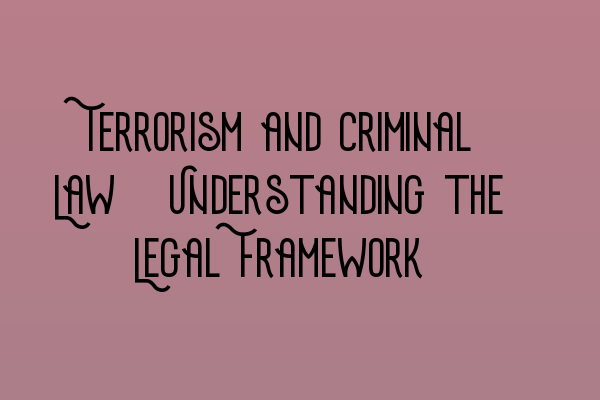Terrorism and Criminal Law: Understanding the Legal Framework
Terrorism has become an unfortunate reality in today’s world, posing significant threats to national security and public safety. In order to combat this menace effectively, it is crucial for legal professionals to have a solid understanding of the legal framework surrounding terrorism and criminal law. This article aims to shed light on the complexities of this area and provide insights into how the legal system addresses acts of terrorism.
The Definition of Terrorism
Before delving into the legal aspects, it is essential to have a clear definition of terrorism. According to the Terrorism Act 2000, terrorism involves the use or threat of action, both within and outside the United Kingdom, that is designed to influence the government or intimidate the public, with the intention of advancing a political, religious, or ideological cause. This definition forms the basis for identifying and prosecuting acts of terrorism.
Terrorism-Related Offenses and Penalties
The legal framework concerning terrorism encompasses a range of offenses, each carrying specific penalties. Offenses related to terrorism include but are not limited to:
- Planning and Preparing Terrorist Acts: Involves the active planning, preparation, and organization of acts of terrorism. Offenders can face lengthy prison sentences and other severe consequences.
- Encouragement of Terrorism: Refers to the dissemination of materials that promote or glorify terrorism. This includes online content, speeches, or writings that incite others to commit acts of terrorism.
- Membership of a Proscribed Organization: It is an offense to join or support organizations that have been officially outlawed due to their involvement in terrorism-related activities.
- Terrorist Financing: Involves providing financial support or resources to fund terrorist activities. This offense includes activities such as money laundering, fundraising, and facilitating transactions for terrorist groups.
The penalties for terrorism-related offenses can vary depending on the severity of the crime. Due to the grave nature of these acts, individuals convicted of terrorism offenses can face life imprisonment, substantial fines, and other significant legal consequences.
The Role of Counter-Terrorism Legislation
Counter-terrorism legislation plays a crucial role in the fight against terrorism. These laws provide law enforcement agencies with the necessary powers to detect, prevent, and investigate acts of terrorism effectively. Furthermore, counter-terrorism legislation can also empower intelligence agencies to collect and analyze information, ensuring timely intervention and disruption of potential terrorist activities.
It is important to strike a balance between protecting national security and upholding civil liberties. Consequently, the legal framework surrounding counter-terrorism measures is subject to regular review and scrutiny to ensure that the powers conferred are used appropriately and proportionately.
Conclusion
As terrorism continues to pose a threat to global security, it is paramount for legal professionals to have a deep understanding of the legal framework governing terrorism and criminal law. By staying knowledgeable and up to date with counter-terrorism legislation, legal practitioners can effectively play their part in combating this menace and ensuring a safer society for all.
For additional resources and information on related topics, we recommend checking out these articles:
- SQE 1 Practice Exam Questions
- SQE 1 Practice Mocks FLK1 FLK2
- SQE 2 Preparation Courses
- SQE 1 Preparation Courses
- SRA SQE Exam Dates
